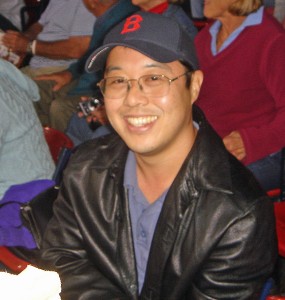
Today we interview Poet Daryl Muranaka, who had work in both the Inaugural Edition (Spring 2015) as well as the Summer 2015 Issue of Gyroscope Review.
GR: Thanks for agreeing to let us interview you for Gyroscope Review. We’re pleased that your work is included in our first issue. Can you please begin by telling us where you’re from, where you write, and why poetry?
DM: I live in the Boston area. I’m originally from California and Hawaii, but I’ve been in Massachusetts for about 15 years, which is longer than any other place at this point. These days, I write on my commute, which is a pretty interesting experience. I got into poetry in college. I wanted to write songs, but was pretty bad at it. Poetry fell into place from there.
GR: Who, or what are your poetical influences?
DM: My original and probably still most important influence is Naomi Shihab Nye. She was the first poet I met and really got me started. She’s always been very supportive of my work. After that, I’ve really enjoyed reading Li-Young Lee, Cathy Song, and Jim Harrison.
GR: How do you decide what ‘form’ a poem should take?
DM: I like little lines, and many of my poems start (and usually stay) with shorter lines. It could be because my writing journal is small. The journal is pocket sized so I can carry it everywhere. Maybe that creates a natural limitation. In the revision stage, the poem tends to tell me what they want to look like.
GR: What is your writing process like?
DM: I like when an idea come back to me two or three times, meaning I let myself forget the poem and see if it comes back. The poem at that point is telling me that it wants to be written. After that, I write at least the first few lines in my head. Those lines live in my “mind attic” for a while. I sit on them for a few days, sometimes a few weeks. If they give me trouble I’ll set them aside for a month or longer. After that initial cooling period, I’ll draft the full poem.
GR: Do you belong to any writer’s groups – face to face or online? If so, are they part of your process?
DM: I don’t belong to any group locally. I really should, though. At the same time, I’m on several groups on Facebook which I love reading. The group I really got the most out of was my Tupelo Press 30/30 Challenge group last year. That was a very supportive and talented group. I don’t usually share my drafts though. I like to sometimes field ideas out there I’m having trouble with.
GR: What do you look for in the poetry you like to read? Any favorite poets?
DM: I like poems where I stop and say, “I wish I wrote that” and know that I can’t. I like poets that are outside my range. I don’t mean that they’re necessarily better than me, but they do work that I don’t or I’m not particularly good at. One of my classmates, Tom C. Hunley, is a good example. He’s ways been more experimental than me and that’s something I admire and enjoy reading. But I know that’s not where my strengths are. It’s a different range from me and that’s a good thing.
GR: What is the most important role for poets today?
DM: I think the most important role for a poet is the same as every artist—to present life in the fullest way possible, to confront the serious problems we face as a keen observer, a deep thinker, and a dynamic empathizer. In this way, I think of many of the best poets I know as people not only of deep feeling but of serious and rational minds. Poets and artists don’t present pretty pictures; they present full slice of life and point the way to human solutions.
GR: Which poets have you had the opportunity to hear read? Alternatively, what is the most recent book you’ve read?
DM: The most recent book of poetry I’ve read was Jim Harrison’s Songs of Unreason. Just before that I read Cathy Park Hong’s Engine Empire. Both are fine books I read last month. I tend to do two a month.
GR: Any future plans for your work that you’d like to talk about?
DM: I’ve got three projects right now: 1) Ohana, which is my second collection of poems; 2) Bubun, a Japanese American-aikido memoir; and 3) a blog book on the martial arts. Ohana is the farthest along, with a complete manuscript that’s being revised. Bubun is in rough draft form and is “resting.” I just started the blog book a couple of weeks ago.
GR: What other interests do you have beyond literature?
DM: I’d like to be more active in Aikido and Tai Chi Chuan. I spent a lot of years practicing hard and I really enjoyed it. It’s the only exercise I really do enjoy. There is an artistic slant to these martial arts which is fun and challenging and I find has a nice flow with writing—they don’t compete but compliment as activities.
GR: Thank you for sharing your thoughts with us. Please let our readers know where they can find more information about you or your work: